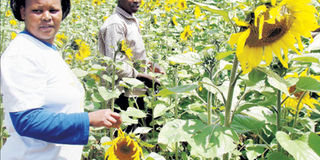Harvest the seed, extract the oil to reap from these crops

Viola Rogony and her employee inspect their sunflower crop at Kapsang Village in Soy Division, Uasin Gishu County. The crop can be used as animal feed. Cooking oil can also be extracted from its seeds. FILE PHOTO | NATION MEDIA GROUP
What you need to know:
- Until his field trip to Kenya Agricultural and Livestock Research Organisation offices in Katumani, Murage, a farmer from Murang’a, did not know how a castor oil plant looked like.
- Jane Maundu from the Ministry of Agriculture explains that although there is a large demand for oil in the country, low market prices discourage farmers.
- Resonating with Maundu’s sentiment, K’okoo says lack of a sustainable market for farmers needs to be addressed before farmers are persuaded to plant the oilseed crops.
He travelled many kilometres from his home in search of agricultural knowledge.
His dusty shoes and suit were a clear indication of his relentless quest. His main aim was to find out how he could harvest aflatoxin-free maize. After all, Agriculture Cabinet Secretary Felix Koskei was in Katumani to launch the construction of an aflasafe lab to counter aflatoxin.
Francis Murage’s efforts were not in vain. His search for knowledge would see him get more information than what he had bargained for.
For years, he has seen a perennial shrub with long stalks and glossy spider-like leaves grow wildly on his farm. After a while, he says, the shrub would wither away and a season later, green capsules containing seeds would appear from new lush green shrubs.
The perennial shrub, Murage would later learn, is one of the precious oilseed crops— castor oil plant.
Until his field trip to Kenya Agricultural and Livestock Research Organisation offices in Katumani, Murage, a farmer from Murang’a, did not know how a castor oil plant looked like.
“Which crop is that on the chart, I have seen it grow on my farm for very many years now but I have never known what it is?” asked an inquisitive Murage while pointing at a drawing of the shrub.
“This is castor oil plant,” responded Orondo K’oloo, an oil and nut crops expert from the research organisation. Like Murage, K’okoo explains that many farmers are oblivious of the importance of oilseed crop farming, which is a large source of nutrition and revenue.
He says many tend to ignore these crops due to lack of knowledge while those who grow them, only know of a few common ones.
“These farmers only know about sunflower and sesame (simsim) crops but not others like castor,” he explains.
So, if oil crops are lucrative for commercial farming, why is it that masked.
Jane Maundu from the Ministry of Agriculture explains that although there is a large demand for oil in the country, low market prices discourage farmers.
IMPORT CRUDE OIL
Maundu says not many factories are willing to buy the oilseed when they can import crude oil for refining.
“Many companies will not buy seed oil from farmers and those who do so, offer low prices.”
Farmers’ lack of access information is also to blame, says Maundu. She says although there are extension officers in the fields, many concentrate on horticultural crops.
Resonating with Maundu’s sentiment, K’okoo says lack of a sustainable market for farmers needs to be addressed before farmers are persuaded to plant the oilseed crops.
“There is no way you will convince a farmer to plant an oilseed crop which fetches between Sh25 and Sh50 a kilo yet they know that the same kilo of beans will fetch twice the amount. There is need to streamline the market in favour of farmers,” says K’okoo.
The expert, however, believes that there is a way out of the discouraging prices for oil crops.
That answer, he says, is to extract the oil.
“A farmer can extract oil and harvest the seed cake from an oilseed crop. The seed cake can be used in making poultry feed. In this way, a farmer can fetch much more.”
“Farmers can process and package the oil from the seeds. When a farmer processes and packages the oil, they will definitely be in a position to sell their oil at higher prices,” says K’okoo.
The quality of the processed oil, he adds, determines the price it fetches.
“Pricing of the oil seeds and the oil itself is often controlled by the demand in the market.”
Maundu adds: “We are educating farmers to adopt commercial farming and among the crops we are advising them to adopt are the oil crops.”
She adds that they are also piling pressure on the government and industries to raise the prices of oil crop products.
After the explanation from K’okoo about the importance of oilseed crop farming, a convinced Murage tried it and his first seeds will come from the Kenya Agricultural and Livestock Research Organisation.
The state agency will also link him up with buyers like Bidco and Kilimanjaro Millers, who are buying the seeds from farmers.




